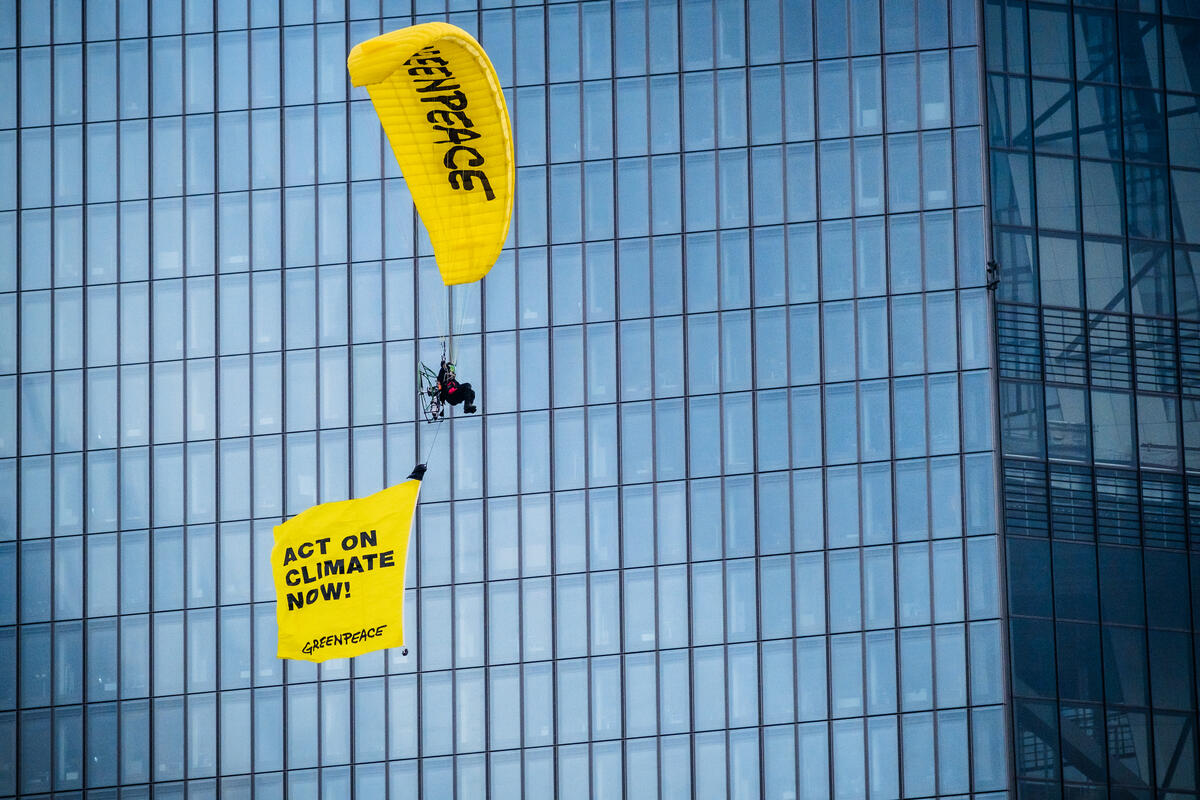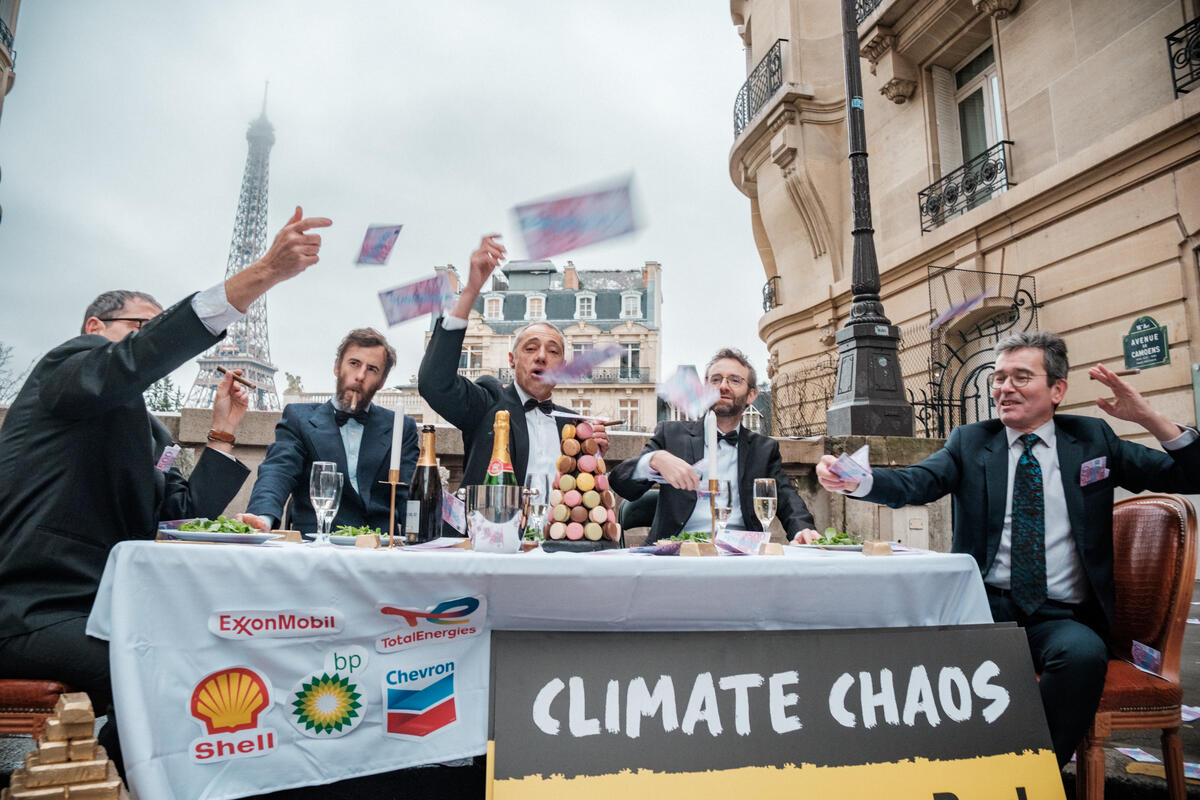Today, the European Central Bank (ECB) governors are convening for the final time this year for a monetary policy meeting. What they discuss in Frankfurt will be revealed at their usual press conference, but one discussion that is either too contentious to publicly reveal – or possibly not even happening at all – is about the ECB selling corporate bonds issued by the most polluting companies in their portfolio.
The European Central Bank must decarbonise its corporate bond portfolio
Earlier this year, Isabel Schnabel – a member of the ECB Executive Board, made a case for the bank to intensify its efforts to support the green transition. In simple terms, she claimed that the ECB needs to be actively selling corporate bonds of the most polluting companies in its portfolio in order to speed up the reduction in greenhouse gas emissions for which it is responsible.
Research commissioned by Greenpeace's Money for Change campaign and published in the "Broken Promises: The ECB's Widening Paris Gap" report in July 2023 – the same month that ECB completely stopped reinvestment of money it was getting from corporates bonds reaching maturity – arrived at the same conclusions: without additional measures, the gap between what the Bank needs to do in order to stay aligned with the goals of the Paris climate agreement and what it actually does will only widen. Selling bonds of the most polluting companies in its portfolio, starting with those of European oil and gas majors such as ENI, Shell or TotalEnergies, is the first step with the biggest impact.

Such an approach was also demonstrated in Greenpeace Central and Eastern Europe's Dirty Dozen report published in August: European oil and gas companies – while making claims about their green transition – are in fact kicking the can down the road and postponing action until after 2030. This is despite the ECB's second economy-wide climate stress test showcasing clear benefits of an accelerated green transition to a net zero economy for companies, people and banks in the Eurozone. One figure captures the lack of progress of the 12 European oil and gas companies analysed in the Dirty Dozen report: until the end of 2022 a minuscule 0.3% of their combined energy production came from renewable energy. The global picture when it comes to the oil and gas industry is unfortunately very similar. As documented in the November 2023 update of the Global Oil and Gas Exit List (GOGEL): "96% of the 700 upstream companies on GOGEL are still exploring or developing new oil and gas fields. And 1,023 companies are planning new LNG terminals, pipelines or gas-fired power plants."
A handful of companies (like Shell, TotalEnergies and ENI) are responsible for the European Central Bank's disproportionate carbon footprint
Analysis from Anthropocene Fixed Income Institute from January 2023 provides an illustration of the role played by the 50 companies with the most greenhouse gas emissions in the ECB portfolio. It showed that the European Central Bank could radically cut the carbon footprint of its corporate bond portfolio by selling just 50 billion euros of polluting companies' debt and that the 25 top polluters account for 87% of carbon emissions in the ECB portfolio. 6 out of the top 10 companies with the highest carbon emission estimates were European oil and gas companies covered by the Dirty Dozen report.
Shell and Total topped the list with ENI ranking third when it comes to the estimated worth of corporate bonds held by the ECB.
At first it seemed that the ECB was genuinely concerned and had got the message. We have heard answers from the ECB President Christine Lagarde explaining that ECB staff are working on new measures to align the ECB corporate bond portfolio with the Paris agreement in 2024. Journalists and civil society asked questions and urged the ECB to sell those bonds.
President Lagarde during the Hearing of the Committee on Economic and Monetary Affairs of the European Parliament at the end of November stated that the ECB recently concluded a one-year review and committed to reducing carbon in its portfolios through 2024 in line with the Paris Agreement. She added that the ECB sees that "issuers of the bonds it holds are actively working to reduce their carbon footprint, with benefits for society at large. Looking beyond 2024, the Governing Council is committed to considering ways to ensure the further decarbonisation of our corporate portfolios on a path that supports the Paris Agreement objectives, without prejudice to our price stability objective."
In the light of all the data on investments and expansion plans by European and global oil and gas companies, it is difficult to understand on what the ECB is basing its claim that bond issuers are actively working to reduce their carbon footprint. The ECB claims to be a data-driven institution: we urge it to provide data showing that the six oil and gas companies in its corporate bond portfolio (Shell, Total, ENI, Repsol, OMV and BP) are actively working to reduce their carbon footprints.

More importantly, it looks like the ECB has also decided to postpone additional measures to decarbonise its corporate bond portfolio fast – selling bonds of companies with the biggest climate footprint and least progress on decarbonisation – it will adopt a wait-and-see attitude in 2024. This would be unacceptable. The ECB needs to stand up to the challenge of the times and work for the benefit of current and future generations.
Kuba Gogolewski is Lead Campaigner with Money For Change Greenpeace European Campaign.






